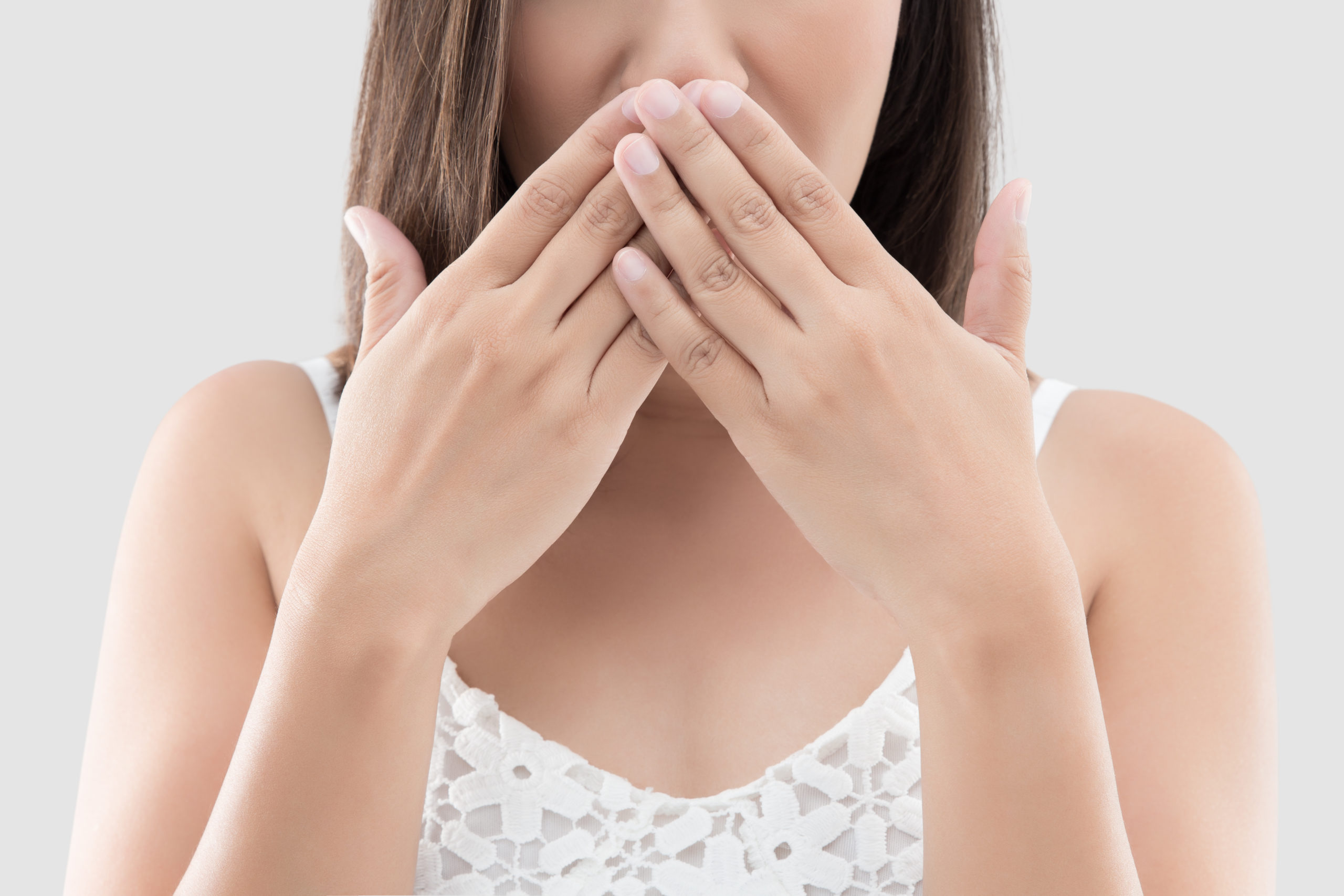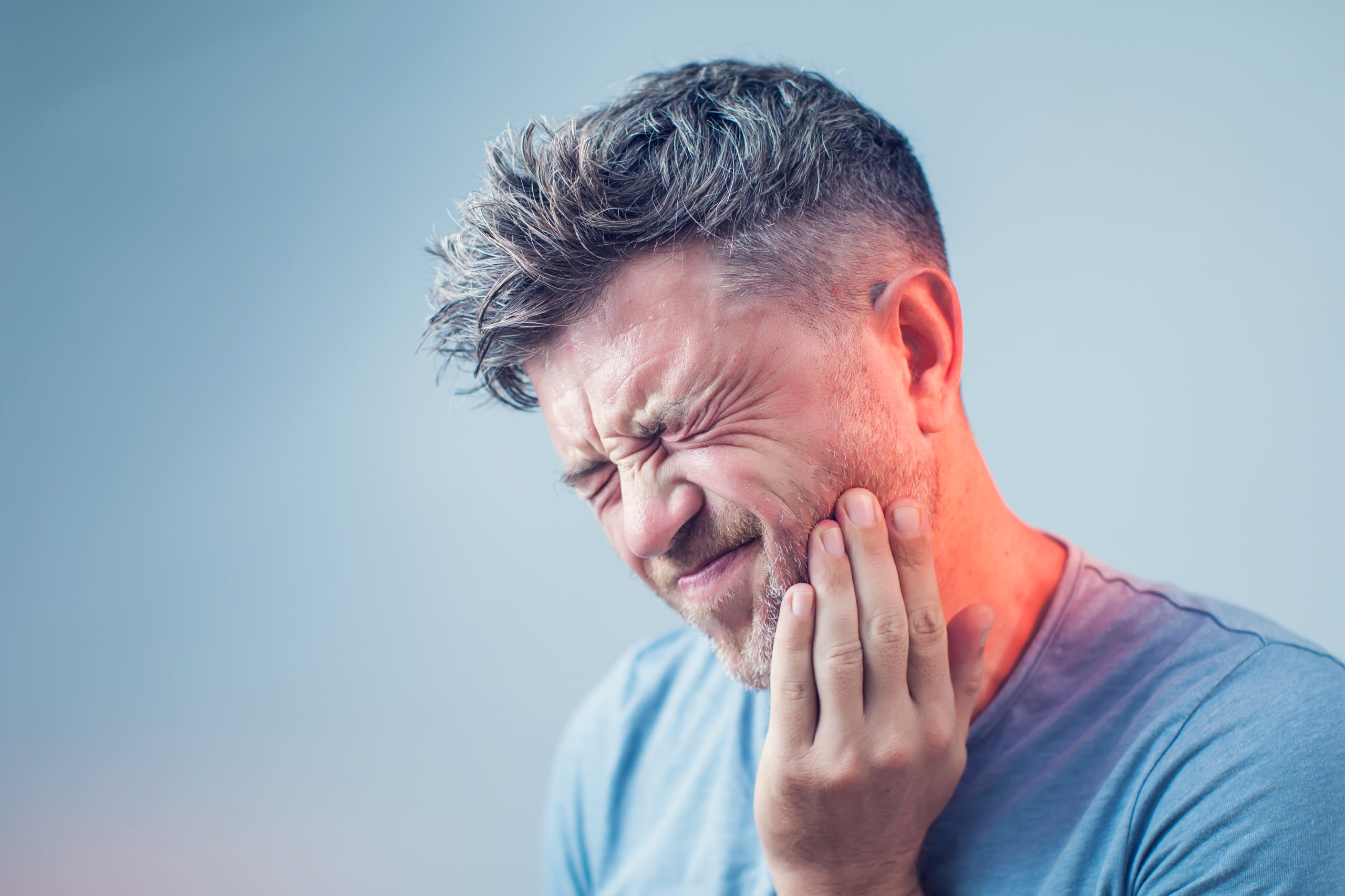Halitosis, or bad breath, can have a number of causes. One of the biggest and most common of these is oral thrush as a result of a fungal infection. Candida Albicans can cause a large white, yellow, or brownish patch on the tongue. This typically forms when saliva flow is low, there is increased mouth breathing, insufficient oral hygiene, smoking, or in cases of reduced immunity.
Saliva is not only important to flush away bacteria from the teeth and gums, but also fungal pathogens from the tongue. Low saliva flow is called Xerostomia. When this occurs pathogens are allowed to accumulate and settle in on the tongue resulting in oral thrush.

Xerostomia can be caused by dehydration, most medications, caffeine and alcohol consumption, smoking, advancing age, and Sjogren’s syndrome (an auto-immune condition of the salivary glands that commonly presents with other auto-immune conditions.)
To improve xerostomia drink plenty of water, switch medications (where possible), reduce caffeine and alcohol intake, and quit smoking. There are also certain aides you can purchase that can stimulate saliva flow delivered in mouthwashes, toothpastes, and gels.
Mouth breathing may be due to sinus congestion, so if there are issues here it is advisable to investigate these with your GP or an Ear Nose and Throat Surgeon. Nasal sprays can be useful for periods of heavier congestion.
In addition to improving your saliva, brushing your tongue every time you brush your teeth will help clear this fungal accumulation. Using your toothbrush is fine, however, since a soft or ultrasoft toothbrush is the preferred brush for your teeth, it is best to use a tongue scraper. You can also use fungal lozenges and gels that your dentist can prescribe for you, though these tend to have a somewhat limited effect.
Whenever you notice any abnormal patches on your tongue or elsewhere in your mouth, ensure you see your dentist to investigate. Though oral thrush is the most common cause, this could be due to other conditions which will need further treatment.
Gum Disease
When halitosis is particularly mentionable by your peers, it could be due to gum disease, either severe gingivitis or periodontitis. Both will present with red, bleeding gums, particularly when brushing and flossing. Without intervention, gum disease is likely to worsen over time and can lead to wobbly teeth and early tooth loss.
To prevent gum disease ensure you are brushing for two minutes, twice a day, brushing your gums gently but thoroughly. Floss at least once a day. Don’t be scared if you see any bleeding. Bleeding means there is bacteria and it’s the bacteria inflaming your gums. Remove the bacteria and the gums should improve.
Ensure any issues with the gums are assessed by a dentist. Once severe periodontitis sets in the damage is often irreversible. Bad breath from gum disease generally responds very quickly to treatment.
Reflux
Reflux can occur with a weak oesophageal sphincter (GORD), related to your diet and quantity of food eaten, stomach ulcers, or from other issues from the stomach or gastrointestinal tract. When halitosis is caused by reflux you’ll likely experience multiple periods of an acidic taste occurring in your mouth. You may also present with a higher amount of tooth wear. Drinking plenty of water and eating smaller portions may help. Also avoid acidic and carbonated beverages. If simple changes to your diet doesn’t improve your reflux it is best to investigate with your GP.
Tonsil Stones
Small white/yellow calcifications may develop within your tonsils which are generally shed from time to time. Tonsil stones are more likely to occur with dehydration and regular alcohol and caffeine intake. Most of the time these will be shed and swallowed without you realising, though someone smelling your breath at the time may detect something a bit stale. Unless you suffer any symptoms tonsil stones aren’t usually too much of a concern. Simply drink plenty of water and few, if any, tonsil stones will develop. If you notice a fair number of these shedding, or have sore, enlarged tonsils without signs of an infection, have your tonsils examined by your dentist or GP.
Tooth Decay and Abscesses
When bad breath is a result of tooth decay or abscesses within the mouth, you’ll likely be aware of the issues. For tooth decay to be severe enough to cause halitosis you’ll be able to feel the size of the holes easily with your tongue. Abscesses will usually be quite painful. There may be pus leaking giving a foul taste and cellulitis, swelling around the cheeks and jaws. See your dentist immediately if you show any of these conditions. Cellulitis is of particular concern, as swellings arising from infected teeth could also block airways in severe cases.
Lesions Within the Mouth
Sores, cuts and ulcers could also lead to bad breath. In cases of extracted teeth, food can occasionally get caught here and will cause a smell. Keep any lesions clean with salt water rinses and ensure you do not pick at the area. Picking at sores will remove the healing factors in place and delay healing. If any sore persist after two weeks without improvement or worsening smells see you dentist immediately as this could indicate an infection or some other chronic condition.
Lesions that do not resolve in time or come and go, that are painful or bleed, should always be assessed by your dentist. Some of these could be auto-immune related or, in rare cases, carry carcinogenic properties. Early identification and management is vital in these cases.



Hi Danielle, I’ve had bad since I was 16, when I began to smoke and had oral sex. Recently, I’ve noticed a white flaky stuff ony tongue. This occurs like every other week. I gave up smoking and oral sex over 20 years ago. Can it be caused by candida? I’m 61yr old now.
Hi Kofi,
White build up on the tongue is most commonly caused by oral thrush (Candida). It is more common if you have a dry mouth, are a mouth breather and have trouble breathing through your nose, smoke, drink alcohol, and are dehydrated. Simplest first step is to brush your tongue every time you brush your teeth and drink plenty of water. Quitting smoking and reducing your alcohol intake will help. Unfortunately, as we age we tend to produce less saliva and suffer from dry mouth more, especially if medication is taken regularly. Using aids to improve your dry mouth (if you experience this) such as oral 7 products can help to improve saliva flow. Investigating nasal congestion can help reduce mouth breathing tendencies. Oral thrush is not a condition to be particularly concerned about and with some people it’s about minimising the fungal buildup. These white/yellow plaques could represent other conditions however, so it is recommended to see your dentist if any suspected thrush does not improve at all or particularly if symptoms develop.
Hello,
I have suffered from severe halitosis. And, no one seems to know or care to investigate the cause of it. The smell is extremely strong, to the point that I can smell it.
Hi Elisabeth,
More severe halitosis is typically found in cases of gum disease. If you notice any bleeding with brushing and flossing I recommend you see your dentist or oral health therapist promptly as gum disease can progress if left unchecked. Gum disease is a condition where most people are susceptible to different degrees and worsens with age. It requires good home oral hygiene and regular dental cleans to prevent its development. Another major cause of halitosis is reflux and digestive problems. If you notice halitosis worse after eating large meals then your GP can help you look into this further. Other reasons can be tooth decay/thrush/tonsil stones. Checking for tooth decay with your dentist, brushing your tongue and drinking plenty of water can help if halitosis is caused by any of these reasons.
Hello,
I have severe thrush in my mouth. It’s been more than 6-7 years or maybe more than this but it come to my attention past 6-7 years. My age is 24. I do not have any kind of pain in my mouth but it is really smelly, my friends told me several times that I have bad breath, and even after brushing my teeth, the smell is still there. My tongue usually has a white coating and also the roof of my mouth has had a white coating for years and it never goes away. Sometimes there is also whitish material on my lips when I wake up. I have tried many things including fluconazole, miconazole, and nystatin but the smell in my mouth never goes away including whitish fungus. The smell from my mouth is very strong, sometimes I feel a bitter taste in my mouth and dryness and at that time the smell and thrush are really strong. Whenever I eat sugar or foods including sugar and dairy products (white flour, milk, bananas, cold drinks, etc) then my condition enhances. I have tried many mouthwash but nothing worked for me. The smell and whitish fungus from my mouth is very stubborn. Kindly suggests to me any remedies or what to do.
Hi Noman,
I suspect you might have a particularly dry mouth and may be a mouth breather. If you have any nasal congestion looking at ways to correct this may help your salivary flow. Checking in with your GP and potentially ENT if you have nasal or sinus congestion would be a good first step. Looking into nasal sprays, saline or steroid based can be used more long term for nasal congestion. For dry mouths, using oral 7 products can help improve saliva flow as well as drinking plenty of water, particularly after eating sugary foods and diary products. Also brushing your tongue with a tongue scraper is more effective than your toothbrush. Mouthwashes and antifungals generally have a fairly limited effect, Listerine mouthwashes tend to have alcohol in them which will further lead to drying your mouth and could even exacerbate your oral thrush. Drinking alcohol will also make this worse, particularly nights where you have a few drinks or more. Try to limit how much you alcohol you consume and drink plenty of water. Coffee, tea, and other caffeinated drinks, can similarly dry out your mouth so best to cut this down too.